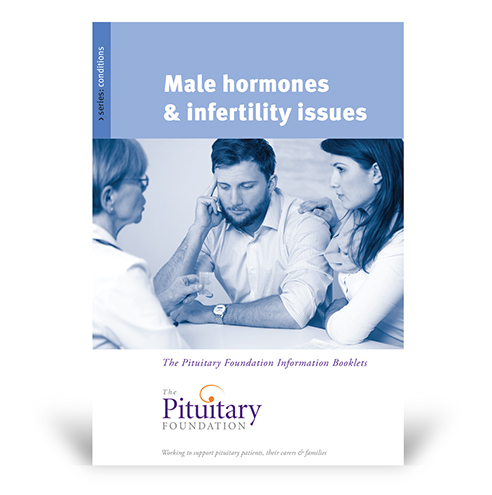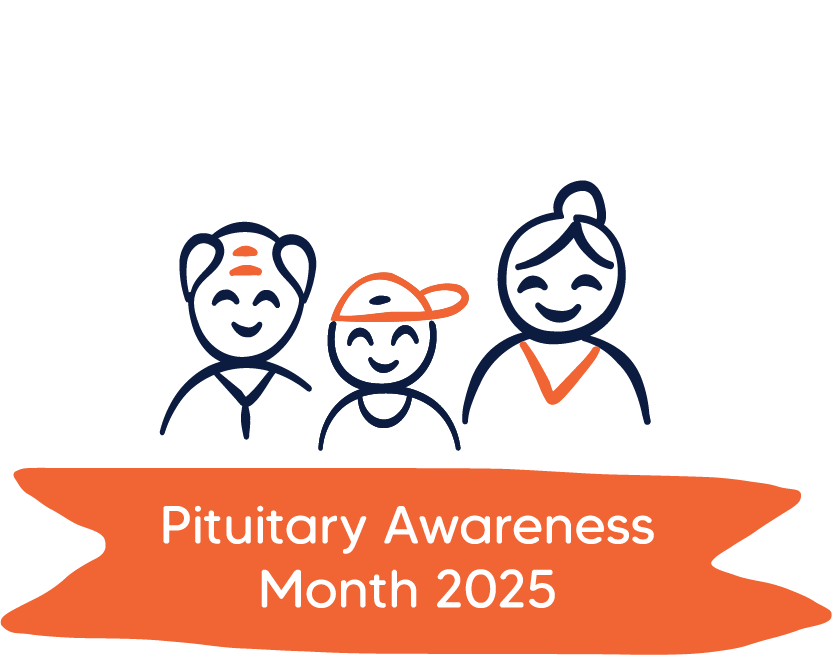How a pituitary condition may impact personal relationships
It is entirely possible for people with pituitary conditions to have and maintain normal relationships throughout their life. There may however be certain barriers to building and maintaining that someone with a pituitary condition may experience. This could be due to the physical impact of their condition, such as fatigue or pain getting in the way of socialising and dating. This may also be due to the emotional impact of living with a pituitary condition, and the ways that this impacts communication and your relationships with others.
Your confidence may be affected by your condition and you may prefer meeting people you already know, rather than having to meet new people. You may also face practical issues about getting tired, lacking confidence and having to be near toilets, for example if you have AVP deficiency (previously diabetes insipidus). The unpredictable nature of symptoms and the demands of treatment can result in changes to how you live your life and your life goals, which may affect your personal relationships.
Being open and honest about your condition, and the ways it affects you, is important to help your family, friends and partners understand your situation and how they can best support you.
Our Relationships and Communication Booklet covers how a pituitary condition may impact your relationships, and what to do to help with this.
In the below video Dr Sue Jackson, Chartered Psychologist, discussing self confidence and pituitary conditions.
Pituitary conditions, sex and fertility
Having a pituitary condition does not in itself stop a person from wanting, or having, sexual relationships. Hormones and the effects of your condition and hormone replacement (such as tiredness, body image concerns and lack of libido) may impact this though. You should know that it’s very reasonable and normal to discuss any concerns you may have with your endocrinologist or endocrine nurse about your sex hormones (testosterone and oestrogen), and the impact of your condition on your sexual life.
Many people with pituitary conditions do go on to successfully conceive and birth children. However, as pituitary conditions affect hormone function, some people may experience issues with fertility. This depends on which condition someone has and their hormone function.
Why do pituitary conditions affect fertility?
In both men and women, the pituitary gland makes hormones (luteinising hormone, LH, and follicle-stimulating hormone, FSH) that help the sex glands to function. If production of these hormones is impacted, it can cause fertility issues, as the sex glands no longer function properly.
In women, FSH and LH is needed for the ovaries to make the hormone oestrogen. Oestrogen is needed for ovaries to mature and release an egg cell (oocyte), which can then be fertilised by a sperm cell. Loss of these hormones can lead to loss of menstrual cycles and ovarian function, which can cause fertility issues.
In men, FSH and LH help the testes to make the hormone testosterone, which is needed for sperm production. Loss of these hormones in men can lead to low/no sperm count.
You can watch the below video to find out more about how pituitary conditions can affect fertility in men and women.
Our male hormones and fertility booklet explains more about how male hormones can be impacted by pituitary conditions and how this can cause fertility issues.
Find out how different pituitary conditions may impact fertility
The most common pituitary condition that can cause fertility issues is a prolactinoma. This can result in loss of menstrual periods or loss of ability to make sperm, thereby reducing or stopping the ability to conceive.
For both men and women, it is still possible to conceive a child if you have a prolactinoma. Often, once you are receiving treatment and your prolactin levels return to normal, your fertility returns. How long this takes depends on the size of the adenoma (tumour) causing the excess prolactin, and the amount of prolactin being made.
Prolactinomas and pregnancy
The treatments used for prolactinoma (i.e. dopamine agonists) can cause issues during pregnancy, so care should be taken if you are continuing this medication throughout a pregnancy. Pregnancy also makes it more difficult to monitor prolactin levels, as these rise naturally as a result of being pregnant. You should discuss pregnancy and your prolactin treatment with your endocrinologist, to understand the safest approach for yourself and your pregnancy.
Some pituitary conditions can result in loss of gonadotroph function, which impacts production of luteinising hormone (LH) and follicle stimulating hormone (FHS). This can present a complex problem, as it means the testees will not be stimulated to produce sperm, or the ovaries are not stimulated to produce eggs.
If this is the case for you, you will likely be referred to a specialist fertility team, often through gynaecology services. Treatment can involve injection with hormones to stimulate these processes. These injections are self-administered and you will be taught how to do this. The fertility team will make you aware of any potential side effects or things to be aware of.
What to do if I want to conceive?
If you have a pituitary condition and are worried about any possible impacts to your fertility, you should speak to your endocrine team. You should also speak to your endocrine team if you have a pituitary condition and want to become pregnant. Even if you do not experience any fertility issues, it is important to discuss pregnancy with your endocrine team, to understand how pregnancy may impact your pituitary condition and any treatment you are undergoing.
What if I don’t want children now, but I may in the future?
If you are being diagnosed with, or treated for, a pituitary condition, you should discuss this with your endocrine team. It may be possible to refer you for things like sperm banking, to help you with future plans to have children.
Support for those experiencing fertility challenges
Over 3.5 million people in the UK experiences challenges with fertility. Experiencing challenges with fertility can be very distressing, and put a lot of strain on both yourself and your relationships.
There is lots of support available for those experiencing challenges with fertility, and there are options that can be explored.
Fertility Network UK offers a wide range of support and information for people experiencing fertility issues.


















